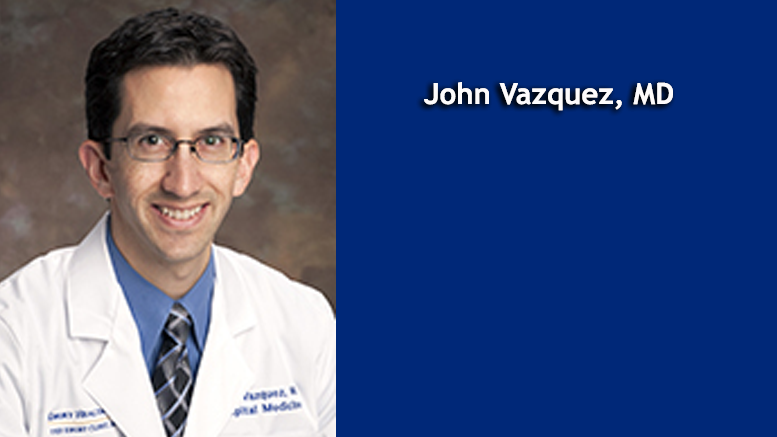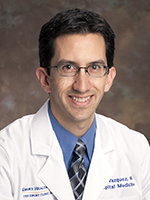By John Vazquez, MD (Emory Division of Hospital Medicine)
PART 1 of 3
Not long ago, I was at a wedding with my wife, and another couple asked what I do for a living. I used to feel silly telling people that I’m a doctor, because I worried about what preconceived notions they might have (and that they would then ask how many Ferraris I have and whether I live in a mansion with a butler). While I do not yet have a Ferrari, I’ve learned that people will keep asking until they get a clear answer, so, I generally end up ‘coming clean’ about being a doctor.
This is evidently not a sufficient answer because, rather than asking how many butlers I have [I don’t have one yet], they tend to say, “What kind of doctor?!” I reply, “A hospitalist.” Usually, I’ll get a blank look from the other couple while my wife knowingly tends to her wedding beverage of choice—she knows this conversation all too well. “When someone needs to be admitted to the hospital, a hospitalist is usually the person who admits them and sees them through their stay,” I say.
“Ah!” they smile, “So you work in the ER!” …My turn: “No. Well… sometimes, yes. We admit patients that the ER can’t send home.” At this point, most people don’t know how to respond. One of them will usually say, “Oh…” and then dive into their glass of wine, while another looks around nervously, as if to catch an appropriate follow-up question, which is usually, “So, you do a lot of surgery, huh?” At this point, my wife will chime in with a life-saving “If your heart stops in the hospital, he’s the guy who will code you!” If only they would just jump to asking about that Ferrari.
So, what do we do, exactly? Hospitalists have special knowledge about how to take care of patients requiring hospitalization, but exactly how this is done is constantly changing. While the changes in health care are not something unique to hospitalists, we’re unique because we serve the hospital as well as the patient. Patients are No. 1, of course, but we’ve earned our role by helping the hospital improve their systems and efficiency.
Initially, we were the masters of decreasing length of stay and cost while improving patient-care quality and communication. We still do those things, of course, but as health care becomes more complex, we find ourselves helping the hospital with things that, traditionally, no single physician can do alone. Even length-of-stay is not something that the physician controls alone, but we now find ourselves being asked to improve ED flow, among other things [That couple would be thrilled that we help in the ER!].
In fact, the latest concern across Emory Healthcare is patient flow across the entire Emory system, something that involves a huge amount of people; data; policies; laws; hospitals; and, of course, doctors; advanced providers; and nurses. So, in addition to our other responsibilities, are hospitalists now to be leaders and experts in intersystem patient flow? In my book, the issue of patient flow directly impacts patient care and hospitals. So, I would argue that the answer is yes.
This ‘yes’ presents us with some exciting opportunities. Any project that has the attention of Emory Healthcare’s entire leadership team is going to pay us back if we are the innovators of this needed change. While it will be complex for our division to tackle an issue that exists slightly beyond our reach—and exists even between hospitals—this is an area where we can really shine.
In the next newsletter, I’ll outline a number of specific examples that may help position our division for success.
NEXT Operations Blog – Part 2 of 3 (with some specific examples)
John Vazquez
jrvazqu@emory.edu
Related Links
- Emory University Department of Medicine
- Emory University Division of Hospital Medicine
- Educator Spotlight: Theresa Vettese
If you are interested in investing in research, clinical care, and/or education within the Emory University School of Medicine’s Division of Hospital Medicine, learn how you can help.


